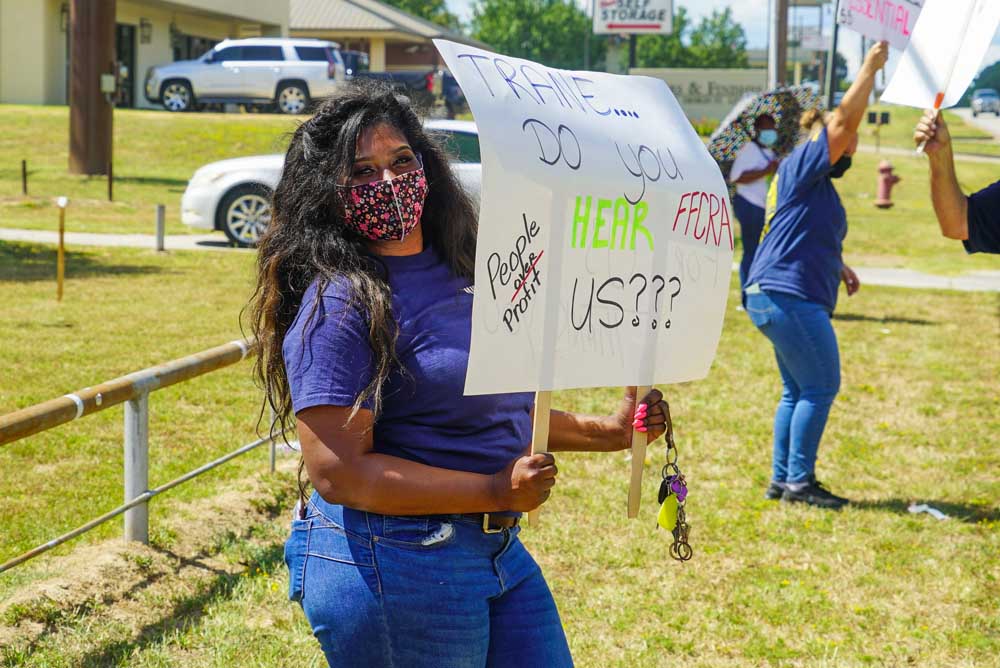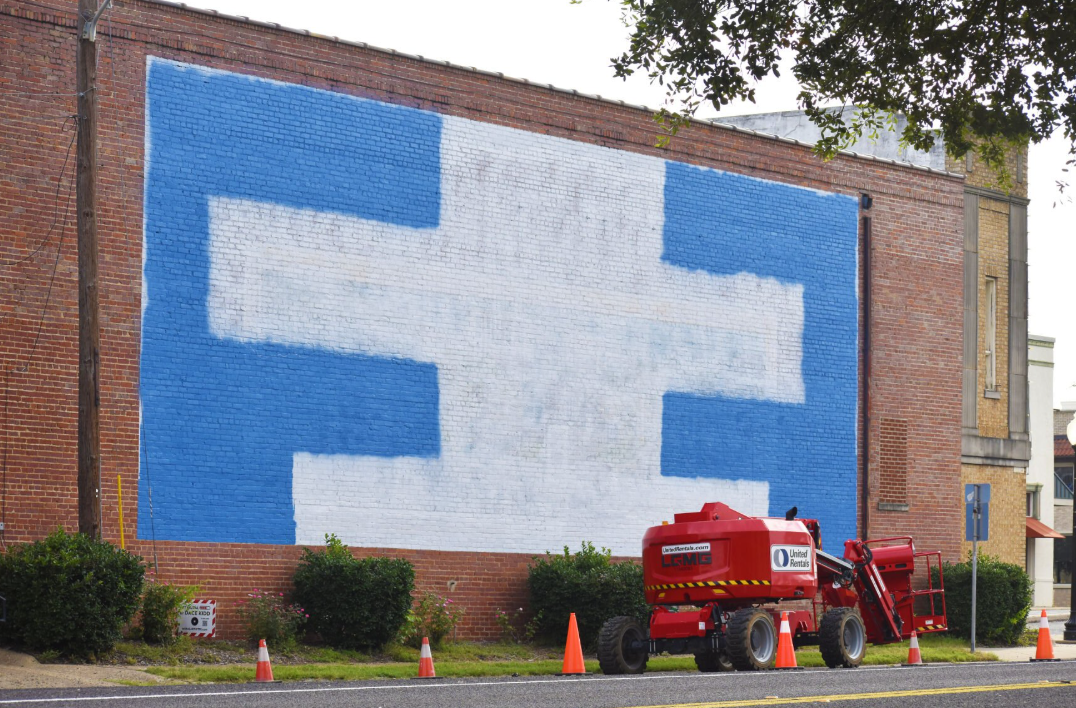Trane employees picket over ‘unfair working conditions’ amid pandemic
Published 5:58 pm Tuesday, August 25, 2020

- Trane employee Tierra Griffin holds up a sign that reads "Trane, do you hear us? People over profit" to protest Trane's alleged unfair working conditions.
On Tuesday, more than forty employees lined Highway 69 armed with signs, a megaphone, and one, unified message: Essential employees, essential pay.
“We’ve been telling the company what we want,” Shanice Canada, a seven-year employee and quality inspector, said. “What else can we do besides make it be known that this is what we want from our company?”
Trending
Members of Trane’s IUE-CWA Local 86782 union picketed to ask for fair wages, safer working conditions, paid sick leave and a cap on mandatory overtime.
The union began negotiations with Trane on Aug. 3, but their union contract expires on Aug. 29. The union hasn’t told members how negotiations are going, said Katrice Pabon, a zone lead for the assembly line.
“Based on the events that have taken place in the last couple of days, which is why this (picket) came up as well, there are some things that they’re not agreeing on,” Pabon said.
Many of these issues, Canada said, have been addressed and lobbied for by the union for years. But the pandemic has exaggerated the issues to where they can no longer be ignored, she added.
“While this pandemic is understandably causing a lot of concern for everyone, the vast majority of our employees have expressed that they are pleased with the measures we are taking to keep everyone safe, and are glad they are able to continue working and meeting our customers’ critical needs,” said a Trane spokesperson in an emailed statement.
Canada says that Trane has not increased its janitorial staff during the pandemic, and less than five janitors are on staff for each shift of upwards of 1,000 workers. Often, Canada says, employees bring their own sanitizing products from home to wipe down surfaces.
Trending
If an employee is sent home to quarantine, Pabon said, they are not required to retest to ensure they are negative before coming back to work. She also described several situations where employees who live together fight to quarantine together, instead of having the “healthy” employee return to work.
“They ask if we have any COVID symptoms (when we come into work) if you say no, they don’t ask any questions,” Pabon said. “They have been turning people away, so in that instance, I can applaud them for that.”
Pabon said she feels anxiety about returning to work; she often thinks, “Is this the day I get COVID and bring it home to my family?”
But fear for their health isn’t all. Bathrooms have long smelled like sewage and the ceilings have leaked over work areas, Canada alleged.
Amid these conditions, employees are working more than 10-hour shifts, Canada said, from 3 a.m. to sometimes 2:30 p.m., as well as working mandatory overtime on Saturdays for the past three months.
“We’re missing out on our children growing up, ‘cause by the time we make it home from work, it’s strictly take a shower, grab something to eat, and go straight to sleep,” Canada said.
Both Pabon and Canada make roughly $15 an hour and get a 40-cent raise per year. Meanwhile, they said, some temporary workers that Trane brings in will make their same wages within a year of working at the company.
“We’re just hoping they’ll close the wage gap,” Pabon said. “I’ve been there for about eight years, but people who have been there 10 to 12 years are making at least seven or eight dollars more than me an hour.”
Employees also have demanded appreciation from the company for their work.
“We haven’t even received a thank you from the company, like ‘thank you guys for working during a pandemic,’” Canada said. “We haven’t received anything except mandatory overtime, all the time.”
After hitting their production goals for two months straight, Canada said, the company did give them t-shirts that said “good job.”
“We’re working hard, could we get something other than just a t-shirt?” Canada said.
Due to coronavirus, employees are asking for a new policy on paid sick leave.
“A lot of people are worried they’ll be terminated if the call in sick, because you have to go through so much just to get a day off,” Canada said.
Trane works on a point system, Canada explained. If an employee is late or misses a day of work, they get a point against them. Even if an employee follows Trane’s protocol of getting a doctor’s note or documentation for being out sick, employees get a point marked against them, Canada said.
Three points warrant a verbal or written write-up. More could warrant termination.
Because of this, Canada said, people will “hold their coughs” through the checkpoints and come in while sick.
A statement from Trane said that all employees who have reported positive coronavirus cases have contracted the virus from the community spread, not the company.
“They can’t say whether it’s coming from in there or out there, they don’t know where it’s coming from,” Pabon said. “It’s just there. There’s too many people, there’s too many factors to take into consideration to know for a fact where it’s coming from.”
Many of the employees asked Trane to opt-in to the Families First Coronavirus Response Act, which requires employers to provide employees with paid sick leave, including if a family member gets sick, for COVID-19 related illness.
“While FFCRA doesn’t apply to our business (since we have greater than 500 employees) we have a variety of programs to consider as we work with individuals to meet needs for emergency time-off due to illness, quarantine or other issues – including short-term disability, emergency leave, vacation and personal days, and FMLA,” the Trane spokesperson said in an emailed statement.
Often, these other programs don’t offer the financial stability employees need, both Canada and Pabon said.
Pabon, who has worked at Trane for eight years, is only given two days of sick leave a year, she said.
While Trane does offer an insurance plan to its hourly employees, Pabon said it is expensive and has high deductibles and premiums. She hopes Trane will offer a new and better insurance plan, but currently, it’s keeping many employees from seeking medical care, she said.
The only option employees have for long-term paid leave is taking short-term disability, but it only pays for 60% of an employee’s hourly wages and requires a doctor to fill out paperwork, according to Pabon. If even one thing is filled out incorrectly, Pabon said, Trane will deny it.
“If we’re sick, we still need to pay our bills and feed our family,” Canada said.
She has considered taking a second job as prices for groceries have risen due to the pandemic.
The union employees have also raised the idea of hazard pay up to an additional $2 per hour, but the company “hasn’t budged,” according to Pabon.
“We want essential pay,” Canada said. “We want to feel safe at work. We want to be treated like humans and not robots.”
And those on the picket line agreed, chanting: “We are union, we are strong.”






